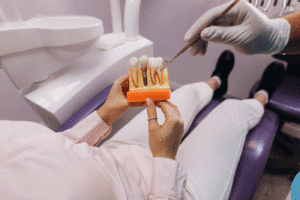Dental crowns are a common treatment to protect, cover, and restore damaged teeth. In essence, they are caps that fit over a tooth to enhance its strength, shape, size, or appearance. Dental crowns can be made from porcelain, ceramic, metal, or a combination of materials. Crowns are often recommended when a tooth cannot be repaired with a filling but is not so damaged that it needs to be extracted.
Crowns are versatile and can address various dental issues, such as:
- Tooth decay: Crowns can cap a tooth that has decayed extensively, preventing further damage.
- Cracked or broken teeth: Crowns protect cracked or eroded teeth, preventing the need for extraction.
- Cosmetic enhancements: Crowns can improve the appearance of discolored or misshapen teeth.
- Post-root canal treatment: A crown can reinforce the tooth structure after a root canal.
- Dental implants: Crowns are placed on implants to replace missing teeth.
Pros of Dental Crowns
- Restores Tooth Function and Strength
Dental crowns can restore the function of a damaged tooth, allowing you to chew and speak properly. The durable material also strengthens teeth, providing protection from further wear or damage. - Long-lasting Solution
With proper care, dental crowns can last 10-15 years or longer. Brushing, flossing, and dental check-ups will extend their lifespan. - Aesthetic Improvements
Crowns are custom-made to blend with your natural teeth. Porcelain and ceramic crowns mimic the appearance of natural teeth, making them popular for front teeth. - Versatile Treatment Option
Crowns can address various dental problems, including covering large fillings, protecting cracked teeth, or completing a dental implant. Their adaptability makes them a go-to solution in restorative dentistry.
Cons of Dental Crowns
- Cost
Crowns can vary in price depending on the material and the location of the tooth. While aesthetically pleasing, Porcelain or ceramic crowns are more expensive than metal ones. Dental insurance may partially cover the cost. - Tooth Preparation
For a crown to fit, a dentist must trim part of the tooth. This process is irreversible, meaning that once a tooth is prepared for a crown, it will always require one. - Potential Sensitivity
Some individuals experience tooth sensitivity after receiving a crown, especially when consuming hot or cold foods and drinks. This discomfort subsides but may persist in some cases. - Risk of Damage
Although crowns are durable, they are not indestructible. Porcelain crowns, for example, can chip or break if exposed to excessive force, such as teeth grinding or chewing hard foods.
Practical Considerations in Choosing a Dental Crown
- Material Choice: The material of the crown plays a role in durability and aesthetics. For example, metal crowns are stronger and less likely to break but are more visible, making them unflattering for front teeth. Porcelain or ceramic crowns offer a natural appearance but may not be as durable.
- Location of the Tooth: The placement of the crown also affects the decision-making process. For molars, durability may be more important than aesthetics, whereas, for front teeth, a natural-looking material may be prioritized.
- Budget and Insurance: The cost of crowns depends on the material used and whether or not insurance covers part of the expense. Clients should consult with their dentist and insurance provider to understand their options.
- Maintenance: While low maintenance, crowns require brushing and flossing to prevent decay around the crowned tooth and gumline. Individuals prone to teeth grinding or clenching may need a nightguard.
How to Decide if Dental Crowns Are Appropriate
| Factor | Considerations | Recommendation |
| Tooth Damage | Cracks, breaks, large fillings, decay | A crown may be the best option |
| Appearance of Tooth | Discolored or misshapen tooth | Crowns, especially porcelain or ceramic, can improve appearance |
| Location of Tooth | Front or back tooth? | Front: prioritize aesthetics;
Back: prioritize strength |
| Budget | Can you afford the crown, and will insurance cover it? | Review all material options and consult with your insurance |
| Tooth Sensitivity | Are you prone to sensitivity issues? | Discuss with your dentist, especially if considering metal crowns |
| Teeth Grinding (Bruxism) | Do you grind your teeth? | A crown may still be possible, but a nightguard may be recommended |
| Durability Needs | Is durability more important than aesthetics? | Metal or porcelain-fused-to-metal crowns are more durable options |
| Dental Implants | Are you replacing a missing tooth? | Crowns are often placed on top of dental implants to restore function |
Conclusion
Dental crowns are a versatile and effective solution for numerous dental issues, providing cosmetic and functional benefits. From restoring cracked teeth to enhancing appearance, crowns can improve oral health and quality of life. While they require an investment and consideration of factors like material choice and tooth location, they are a long-lasting option when properly maintained. If you’re considering dental crowns, Smile Design Dentistry offers expert guidance and a personalized approach to help you. With their experienced team and focus on patient care, Smile Design Dentistry ensures you receive the highest quality dental solutions tailored to your smile.
FAQs
- How long do dental crowns last?
Dental crowns can last 10 to 15 years and sometimes even longer with proper care. - Does getting a dental crown hurt?
The process of getting a crown is done under local anesthesia. Some sensitivity may occur afterward, but it subsides. - Can I eat normally with a dental crown?
Once the crown is placed, you can eat normally. It is advisable to avoid hard or sticky foods that could damage the crown. - How do I care for a dental crown?
Brush and floss regularly, and attend check-ups to ensure the crown remains in good condition. - What are the alternatives to dental crowns?
Depending on the extent of the damage, inlays, onlays, and veneers are possible alternatives. Consulting your dentist will help determine the best option.




